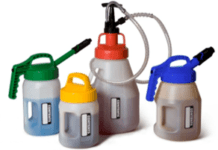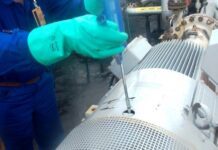
Marcos Thadeu Lobo
Mechanical Engineer Graduated from the State University of Campinas (Unicamp). He currently works as an Associate Consultant at QU4TTUOR CONSULTORIA.
Screw-type rotary air compressors are widely used in industrial applications due to high air flows, low maintenance and high operational reliability.

 Images 1/2 – Screw-type rotary air compressors
Images 1/2 – Screw-type rotary air compressors
Air compressors are benefited using group II base oils
The use of hydrotreated mineral base oils (Group II) compared to those using mineral base oils by solvent route (Group I) has shown an excellent cost-benefit ratio in the formulation of lubricating oils for use in rotary screw-type air compressors, providing the following benefits:
- High resistance to thermo-oxidation with a substantial reduction in the formation of sludges and varnishes catalyzed by the high operating temperatures.
- Elevation of service intervals.
| Base oils used in the formulation | Service Interval |
| Mineral bases by solvent route (Group I) | ~ 1000 hours of operation |
| Hydrotreated mineral bases (Group II) | up to 4000 hours of operation |
- Reduction in production interruptions for changing the lubricating oil charge.
- Increased operational reliability and availability of equipment.
- Excellent cost-benefit ratio (R$/L/hours worked).
- Longer service life for sleeve bearings and male and female rotor drive gears.
Performance of air compressors
Lubricating oils for use in screw-type rotary air compressors usually meet the following performance levels:
- DIN 51506 category VD-L
- DIN 51524 part 2 HLP
- Viscosity grades: ISO VG 46 or ISO VG 68

 Images 3/4 – Thermo-oxidation: sludge and varnish formation.
Images 3/4 – Thermo-oxidation: sludge and varnish formation.
Lubricating oils for use in rotary screw compressors using hydrotreated mineral bases (Group II) also have the following advantages:
- Excellent demulsibility in case of water contamination.
- Excellent foam resistance and excellent air release property to prevent cavitation in lubricating oil circulation pumps.
















